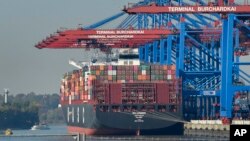President Donald Trump says the United States will impose new tariffs on more than $11 billion worth of exports from the European Union, after the World Trade Organization ruled last year the EU was illegally subsidizing aircraft maker Airbus.
The WTO, in a decision last May, ruled the European countries had given $22 billion in state aid to Airbus to help build its A380 and A350 jets, damaging its U.S. rival, Boeing.
Trump said Tuesday that since the WTO had ruled that the subsidies had "adversely impacted the United States," it "will now put Tariffs on $11 Billion of EU products! The EU has taken advantage of the U.S. on trade for many years. It will soon stop!"
Trump's declaration aside, the new list of tariffs would not take effect until after a WTO arbiter rules on the allowable size of the tariff package, a decision not expected for several months.
The European Union and the United States have for years disputed each other's reciprocal subsidies to Airbus and Boeing, long predating Trump's 27-month presidency. At various times, the WTO has ruled against both.
In first announcing the proposed $11.2 billion in U.S. tariffs on European exports on Monday, U.S. Trade Representative Robert Lighthizer said, "This case has been in litigation for 14 years, and the time has come for action. Our ultimate goal is to reach an agreement with the EU to end all WTO-inconsistent subsidies to large civil aircraft."
He added, "When the EU ends these harmful subsidies, the additional U.S. duties imposed in response can be lifted."
The U.S. Trade Representative's list of products subject to new tariffs extends to 14 pages, including a number of civil aviation products, including Airbus, along with new levies on such food products as swordfish, salmon, cheeses, olive oil and wines, and clothes.
The United States said once the WTO issues its report on the allowable size of the tariffs, it would issue a final list of affected goods.
The European Union and the United States have been working toward a new trade deal after Trump and European Commission President Jean-Claude Juncker agreed last July that no new tariffs would be imposed while the two sides are negotiating.
The ongoing dispute over aircraft subsidies is occurring as Boeing is facing a weeks-long crisis over the worldwide grounding of its fleet of 737 Max aircraft while authorities investigate the cause of crashes of the jetliner in Indonesia and Ethiopia that killed all 346 passengers and crew members aboard the two aircraft.




